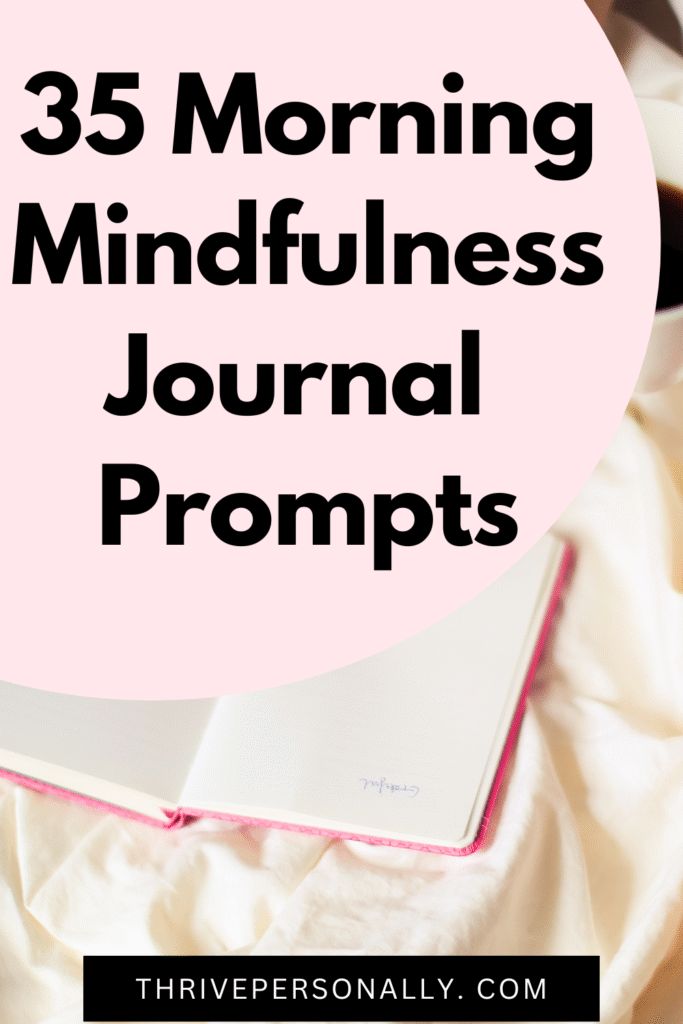I’ve noticed that the way I start my mornings sets the tone for the rest of my day. If my morning feels rushed and chaotic, it usually carries over—I end up feeling unfocused, drained, and a little scattered. But when I take just a few mindful minutes at the start of the day, everything feels different. I feel calmer, clearer, and more grounded.
One simple practice that’s made a big difference for me is journaling. My mindfulness journal isn’t just a place to scribble random thoughts—it’s where I slow down, check in with how I’m really feeling, and connect with the present moment. Writing in the morning helps me understand myself better, stay grounded, and set the right intentions before the busyness of the day takes over.
What Is Morning Mindfulness?
Morning mindfulness is the practice of being present and self-aware as your day begins. It means spending time with yourself before you check your phone, respond to emails, or engage with outside noise.
Being mindful doesn’t mean you empty your head. It means your awareness is sharp and clear. You know what’s happening in your body and your mind, and you face it without judgment. Practicing this awareness in the morning gives you a strong, steady start to your day.
Journaling supports this process. Writing helps you stay present, observe your thoughts, and clarify your goals. It creates a quiet space just for you—somewhere to slow down, check in, and breathe.
Why Use Journal Prompts?
You might feel that journaling could help you, but not know how to begin. That’s where prompts come in. A journal prompt is simply a question or idea that gives your writing a focus.
Morning prompts help you think clearly and stay grounded. Over time, they can help you manage stress, notice patterns in your thinking, and support your personal growth.
According to research from the Greater Good Science Center at UC Berkeley, expressive writing about thoughts and feelings can improve mental clarity and emotional health, while also supporting physical healing and deeper self-awareness.
Read also: 15 Journaling Prompts for Anger
35 Morning Mindfulness Journal Prompts
-
At this moment, what do I feel in my body and mind?
-
What am I most thankful for this morning?
-
How can I make today a good day?
-
Which emotion feels strongest in me lately?
-
What do I want to let go of today?
-
What is something I need to hear today?
-
What is one thing I want to give to others today?
-
What would it feel like to be kind to myself all day?
-
What can I do to love myself today?
-
What is one thing I should keep in mind today?
-
What task have I been avoiding, and why?
-
What are my current personal values?
-
What does peace look like for me today?
-
What can I forgive myself for right now?
-
How can I take care of my mental health today?
-
How can I stay present during difficult or repetitive situations?
-
What is my one-word intention for the day?
-
What are three things I’m proud of myself for?
-
What do I need less of today?
-
What do I need more of today?
-
How can I remind myself that I’m enough today?
-
What small detail do I often miss, but want to notice today?
-
What thoughts do I want to release today?
-
What kind of language do I want to use when I talk to myself today?
-
What does success look like for me today?
-
What burden am I carrying that doesn’t belong to me?
-
What small joy can I choose to include in my day?
-
What can I do to protect my peace today?
-
What have I been criticizing myself for recently?
-
What in my life today is beautiful?
-
What did I learn yesterday that I can use today?
-
What can I offer myself today?
-
What do I want to remember when the day gets hard?
-
How do I want to feel when this day ends?
-
What do I appreciate about my past self today?
Read also: 45 Confidence-Building Journaling Prompts
Why Morning Journaling Helps
Morning journaling isn’t just for reflection. It can actually reshape how your brain sees the world. It reduces stress, builds focus, and helps you move through the day with more purpose and clarity.
A study in Psychosomatic Medicine found that journaling about emotions can help the body respond better to stress. This kind of expressive writing supports emotional balance and boosts well-being. You can read more in the full study here.
Morning is especially effective for writing because your mind is still fresh and unclouded by daily distractions. It’s a clear window into your inner self. The more you make use of that window, the more clearly you begin to hear your own voice.
Final Thoughts
How you begin your morning matters. It’s the starting point for everything that follows. When you start with stillness, awareness, and care, you create a strong base for the rest of your day.
These 35 prompts are here to help you pause, reflect, and step into your day with clarity and confidence. With each one, you make a quiet promise to care for yourself and meet your day with dignity.
Let your journal become a mirror, a compass, and a safe space. A place where your thoughts can breathe. Keep showing up for yourself. Keep writing. The more you return to your morning self, the more peace and strength you’ll bring into the world.
Save the pin for later



